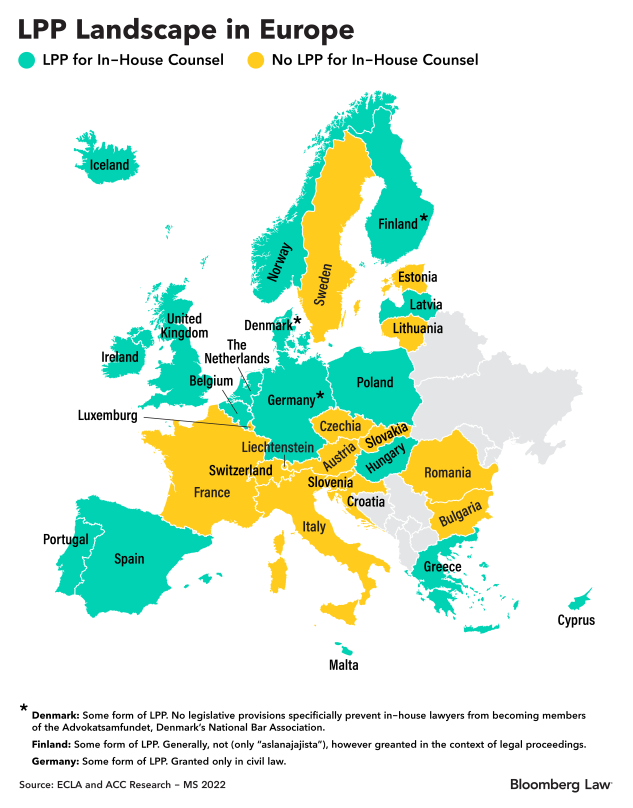[ad_1]
In a historic vote this past June, the French Parliament passed legislation extending attorney-client privilege to in-house lawyers. It may come as a surprise to lawyers who work primarily in the US that the corporations employing in-house counsel in France did not enjoy this privilege for advice from their general counsel.
Attorney-client privilege—known as legal professional privilege in France and many other countries—isn’t universally applied to the confidential legal communications of in-house counsel. Nearly half of European countries currently do not recognize ACP for in-house counsel, and many countries around the world follow a similar model.
France’s movement toward extending ACP to in-house counsel is the latest signal that changes to this long-held divide are gaining momentum. French in-house counsel will gain an equal footing with their peers in common law nations, with French companies reaping the added value.
Global State of Attorney-Client Privilege
Attorney-client privilege is one of the oldest recognized legal confidentiality privileges, critically important to ensuring that the legal system functions justly. It’s prevalent in countries that have adopted the common law legal system, such as the UK, US, Canada, Australia, and Singapore.
The public policy rationale for privilege is to encourage clients to divulge all information to their lawyers, who require this information to provide them with the best possible representation. The ability for lawyers and clients to converse freely strengthens the justice system and promotes the rule of law.
In most common law countries, in-house counsel aren’t classified differently from lawyers who work in law firms. They are members of the relevant bar association or law societies and are subject to the legal and ethical obligations of the profession.
However, in many countries, including several countries with civil law systems, in-house counsel aren’t viewed as equal to law firm lawyers. They aren’t members of the bar and don’t have the obligations or benefits bar members carry, including protected communications.
Currently in Europe, 18 countries recognize ACP for in-house counsel and 13 countries don’t. Of the remaining countries in the Organization for Economic Cooperation and Development, nine recognize ACP and three do not.
However, in recent years, a number of countries have begun to recognize attorney-client privilege for in-house counsel to some extent.
In 2022, the Netherlands’ Supreme Court recognized ACP for in-house counsel who are registered in jurisdictions that recognize privilege for in-house counsel, and who sign a charter or agreement with their employer recognizing their independence as a lawyer. Switzerland also adopted legislation in 2023 extending privilege to in-house counsel, effective in 2025.
The French Justice Bill & Privilege
For more than 25 years, advocates in France sought to have ACP extended to in-house counsel. Opponents of the legislation argued that corruption and corporate misdeeds would increase unchecked if in-house counsel communications with their internal clients were protected from disclosure.
Proponents of the change pointed to a lack of rampant corruption and the ability for in-house counsel with privilege protections to proactively address concerns before they become more serious problems. In addition, French companies—and others that fail to recognize ACP for in-house counsel—have been at a competitive disadvantage with companies headquartered in countries that recognize ACP for in-house lawyers.
Businesses headquartered in countries where in-house counsel advice is protected by ACP have the benefit of lawyers who can engage in a wide range of legal functions while maintaining the confidentiality of those legal conversations. Businesses whose in-house counsel lack this protection must spend significant time and resources securing and corresponding with outside counsel.
They also lose some of the benefits of having a trusted legal adviser who is intimately familiar with the business. For example, if a company experiences a commercial dispute and subsequent litigation, the legal advice, communications, and documents that in-house counsel would normally provide to the business client aren’t protected from disclosure.
Conversely, if the company is located within a jurisdiction that recognizes ACP for in-house counsel, all legal advice and related documentation is protected.
Explicitly acknowledging this competitive disadvantage, French legislators voted to extend ACP to in-house counsel on commercial, civil, and administrative legal matters. No privilege attaches to communications concerning criminal or tax matters. The legislation passed both houses of parliament in France and will face a final vote this fall.
Global Implications for Businesses
The vote in France has widespread ramifications, not only in Europe but globally. The competitive disadvantage for businesses highlighted by French lawmakers is present in other countries as well. It’s also highly relevant for lawyers who practice primarily in the US and enjoy rights that their competitors in other countries don’t.
In-house counsel who have ACP protections must be mindful when interacting with businesses in jurisdictions that don’t recognize ACP for in-house. For example, if they are working with company divisions located in countries that don’t recognize ACP, they must take steps to ensure that the privilege is maintained.
Outside counsel in those jurisdictions may need to be retained to ensure the communications remain privileged.
In-house counsel in countries that currently don’t recognize ACP may assume somewhat different roles and functions than in-house lawyers whose advice is privileged.
As business dealings become increasingly international, recognizing that not all in-house counsel enjoy ACP can prevent missteps and confusion that may destroy important privilege protections and put businesses at a severe disadvantage.
This article does not necessarily reflect the opinion of Bloomberg Industry Group, Inc., the publisher of Bloomberg Law and Bloomberg Tax, or its owners.
Author Information
Veta T. Richardson is president and CEO of the Association of Corporate Counsel and adjunct professor at Georgetown University Law Center.
Write for Us: Author Guidelines
[ad_2]
Source link

